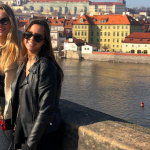Support
“When Culture Meets Science: Exploring The Concept of Terroir in Bordeaux.”
I studied abroad during the Spring of 2019 in Copenhagen, Denmark and was fortunate enough to travel to a variety of European cities that introduced me to different cultures. The two places that made the strongest impact on me were Kangerlussuaq, Greenland where I visited East-Grip, an ice-drilling research center, and Bordeaux, France where I researched the concept of terroir in the wine capital of the world. I believe that my educational endeavors associated with these two trips are what made them so worthwhile.
I chose to travel to France because of my interest in the French language and culture. I had taken French throughout high school and in the Fall of 2017 was taking a French class with professor Eloise Brezault when I decided on doing my research in Bordeaux, France. I felt that it would be a good way to improve my French skills and dive into a topic I was curious about. I traveled to Bordeaux for four days and was able to attend a wine-tasting event in the center of the city as well as visit La Cité du Vine, a museum dedicated to the history of wine and how wine is produced. The museum had an entire exhibition dedicated to the concept of terroir, which can be summarized as the way a specific region's environmental conditions, terrain, and cultivation methods create a wine’s flavor. After learning about the intricacies of wine-making and what makes each type of wine uniquely its own, I have a greater appreciation for what wine is- not only as a drink but as craft and cultural celebration. As a conservation biology major, I also take an interest in the state of our environment in terms of climate change. Although climate change’s impact on wine may not seem like the most pressing issue, it is important to note how our changing environment affects people in many different ways. Since temperature and soil quality are among the most important factor in growing grapes, winemakers’ livelihoods are beginning to be affected by the warming temperatures which threaten the quality of product they produce.
I am able to use what I learned about soil types and our climate’s effect on the phenotypes of crops, in this case, grapes, as a real-world example of how the environment affects us as a society. I can bring this real-world perspective to my classes at St. Lawrence, specifically when learning about human interactions and dependence on our landscapes and what the various resulting impacts of climate change will be. I feel extremely lucky to have traveled to such a diverse and vibrant city like Bordeaux, and it made my study abroad experience all the more meaningful.
